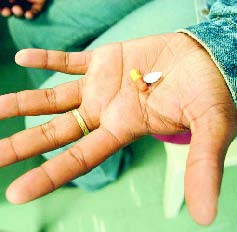Robert Carry: From the Home Front It’s two years since I applied for a one-year working holiday visa for Australia. And rather than being the straightforward, exclusively online affair I was expecting, it turned out to be a little more complicated.
 Because I had spent a period of time living in Thailand – which suffers disproportionately with a number of serious communicable diseases – the Australian authorities required that I be screened for TB. I had to book into a private clinic, pay a (not inconsiderable) fee and have a chest x-ray. I then had to forward the results as part of my application before finally being given the nod.
Because I had spent a period of time living in Thailand – which suffers disproportionately with a number of serious communicable diseases – the Australian authorities required that I be screened for TB. I had to book into a private clinic, pay a (not inconsiderable) fee and have a chest x-ray. I then had to forward the results as part of my application before finally being given the nod.
It was a delay and expense I didn’t need, but I understood where the Aussies were coming from – they were simply trying to protect themselves, and the onus was on me to demonstrate that I wouldn’t pose a risk to their health.
Screening would-be immigrants for diseases is nothing new. Millions of Irish people who settled in the US during the 19th and early 20th centuries were tested on Ellis Island for a host of illnesses before being either granted or refused entry.
In Ireland today, the HSE’s Health Protection Surveillance Centre’s records of the number of new diagnoses of HIV/Aids are intriguing. Of the 312 HIV cases where geographic origin is known that were recorded during 2008, only 123 were in people born in Ireland – 121 were born in sub-Saharan Africa, 28 in western Europe and 17 in central Europe.
The fact that people in certain parts of the world suffer disproportionately from certain diseases is hardly their fault. And it’s perfectly understandable that someone living in a country with a weak healthcare system who discovers they are HIV-positive might want to travel somewhere where they might receive treatment. However, governments have a duty of care to their citizens, and be it TB from Thailand or HIV from South Africa, they should act to protect the public from an elevated risk of disease.
Another issue is the cost involved in providing treatment, as some courses of anti-retrovirals can amount to €1,000 per month. Since most new cases of HIV are discovered in people from abroad, it is fair to assume that the bigger share of the State’s bill for treating the condition will go to people who aren’t Irish.
I don’t see that the Irish nation has an obligation to pay for anything other than our own healthcare, but if we are to do so, then we should be aiming to help as many people as possible with the money we do spend.
Putting it another way, the €1,000 spent monthly on HIV treatment for a sub-Saharan African in Ireland would extend to many more individuals if spent in Africa itself.
To me, the ideal situation would be to introduce screening for the more common communicable diseases, such as TB and HIV/Aids, for visa applicants who have spent time in high-risk areas. Those who test positive should be refused entry. If implemented along the lines of the Australian model, then practically no cost to the State would be incurred as testing would be done in country of origin.
The resultant fall in treatment costs in Ireland could then be split three ways – one third going to improve care for people suffering with HIV/Aids in Ireland; one third going to overseas aid projects in areas hit worst by the virus; and the final third going back into the State’s coffers.
The result would be an improvement in the standard of treatment for people in Ireland with HIV/Aids, an increase in the number of lives being saved or at least prolonged, and big savings for the Government.
It would be very, very tough on the individuals denied the right to enter the country for health reasons, but the most humanitarian way of facing a problem as big as the HIV/Aids pandemic is to save as many lives as possible with the resources available.
Robert Carry has worked as a journalist in Ireland, Thailand and Australia











